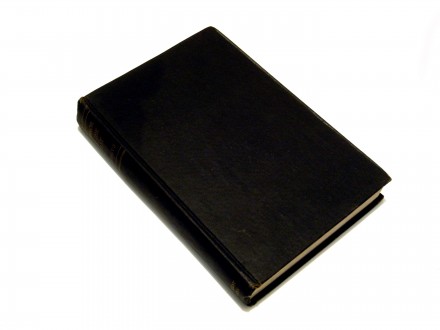Konni Zilliacus - Mirror Of The Past
| Cena: |
| Želi ovaj predmet: | 1 |
| Stanje: | Polovan bez oštećenja |
| Garancija: | Ne |
| Isporuka: | Pošta Post Express Lično preuzimanje |
| Plaćanje: | Tekući račun (pre slanja)
Lično |
| Grad: |
Beograd-Zvezdara, Beograd-Zvezdara |
ISBN: Ostalo
Godina izdanja: 1946
Jezik: Engleski
Autor: Strani
Konni Zilliacus - Mirror Of The Past - A History Of Secret Diplomacy
Current Books, Inc. / A. A. Wyn, 1946
362 str.
tvrdi povez
stanje: vrlo dobro, potpis na prvoj strani.
With an introduction by Max Lerner | League of Nations.World War, 1914-1918 --Causes --World politics. Note: A reissue with new introduction and minor changes in text, of a work published in London (V. Gollancz, ltd.) in 1944 under title: The mirror of the past, lest it reflect the future.
his is a review of the origins and course of World War I and of the subsequent settlement, including the establishment of the League of Nations. The author, whose sympathies lie with the Left, has justified his going over this well-trod ground by stressing the manner in which social issues dominated the later phases of the war and the politics of the peace. He warns against a repetition of the mistakes made during those years.
Mr Zilliacus’s able and well-documented attack on imperialism and power politics consists largely of an exposure of the events leading up to the two world wars. Unfortunately the enthusiasm with which he debunks the war of 1914 makes one wonder on what grounds he is supporting this one. After retelling the sordid story of the secret treaties and commercial rivalries which led up to 1914, he concludes that our declared war aims were lies and that ‘we declared war on Germany because if she won her war against France and Russia she would become master of all Europe, and strong enough to help herself to British colonies’. Why else did we go to war this time? It seems that it was equally wicked to oppose Germany in the decade before 1914 and to appease her in the nineteen-thirties, and that we ought to have made a compromise peace in 1917, whereas it would be treachery to make one now. It was even wicked, in 1915, to agree to Germany being partitioned and Poland being regarded as ‘an internal affair of Russia’: so do the same actions change their moral colour with the passage of time.
The thing Mr Zilliacus leaves out of account is that wars have results, irrespective of the motives of those who precipitate them. No one can question the dirtiness of international politics from 1870 onwards: it does not follow that it would have been a good thing to allow the German army to rule Europe. It is just possible that some rather sordid transactions are going on behind the scenes now, and that current propaganda ‘against Nazism’ (cf. ‘against Prussian militarism’) will look pretty thin in 1970, but Europe will certainly be a better place if Hitler and his followers are removed from it.Between them these two books sum up our present predicament. Capitalism leads to dole queues, the scramble for markets, and war. Collectivism leads to concentration camps, leader worship, and war. There is no way out of this unless a planned economy can somehow be combined with the freedom of the intellect, which can only happen if the concept of right and wrong is restored to politics.
Observer, 9 April 1944
World politics > 1900-1945
World War, 1914-1918 > Causes.
Abyssinia action affairs Agadir crisis aggression agreement Allied governments Ambassador armaments Armistice arms Army attempt Austria Austria-Hungary Balkans Belgian Belgium believe belligerent Bolsheviks Britain British Government Cabinet capital capitalist central powers co-operation Colonel House colonies concessions conservatism and plutocracy Conservative Council Covenant danger demand democracy diplomatic disarmament economic Empire England Entente ernment Europe fact fear fight force Foreign Office foreign policy Fourteen Points France French German Government Germany honour idea imperialism imperialist industrial interests international anarchy intervention Italian Italy Labour party League of Nations Liberal Lloyd George Lord ment military mobilization moral Morocco naval negotiations neutrality obligations organized Paris Peace Conference Persia plutocracy power politics present President Wilson Prime Minister propaganda proposals public opinion question railway Russia Russian Revolution secret treaties Serbia Siberia Sir Edward Grey situation social Socialist territory tion tional trade whole world government
Plaćanje pouzećem i postnetom za sada nisu opcija.
Lično preuzimanje je isključivo na Konjarniku uz prethodni dogovor.
Hvala na razumevanju.
Predmet: 20496161







